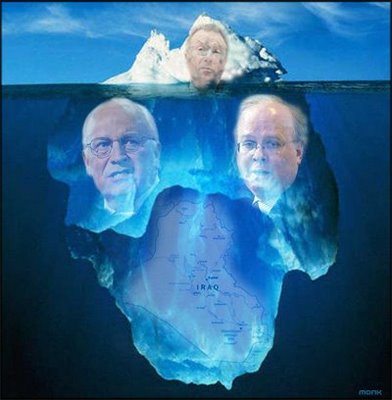
I posted this in my "Capital Games" column at www.thenation.com....
This morning at a briefing on the congressional elections, an event that featured former Representatives Dick Armey, Jennifer Dunn, and Dick Gephardt and that was sponsored by a Washington law firm, political analyst Charlie Cook--an independent handicapper trusted by Ds and Rs--offered good news for the Democrats. He compared 2006 to 1994, the year when Republicans shockingly seized control of both houses of Congress, netting a whopping 52 House seats. Cook noted that in October 1994, 39 percent of Americans said they believed the country was heading in the right direction and 48 percent thought it was on the wrong track. Now the right direction/wrong track numbers are far more negative: 26 percent to 61 percent. In October 1994, President Bill Clinton's approval rating was 48 percent. These days, President George W. Bush is about 38 percent. The approval rating for Congress in 1994 was 24 percent (with 67 percent disapproving). Today, it's lower: 16 percent (with 75 percent giving Congress a thumb's down). In 1994, Republicans had a 6 point lead in polls asking respondents to say whether they preferred a GOP or Democratic candidate. Now the Democrats have a 15 point edge. But when asked if their own member of Congress deserved reelection, 49 percent in 1994 said no; now only 45 percent say no. (In both years, 39 percent said boot the bum out.)
The bottom-line: out of five key indicators of the national politicalmood, four are significantly worse for the Republicans in 2006 compared to the Democrats in 1994. As Cook put it, the 2006 political wave (at this moment) is bigger than that of 1994. But that does not mean the Dems are going to win as many seats as the GOPers did twelve years ago. Gephardt cautioned that congressional districts are far more gerrymandered these days than they were in 1994 (which means fewer are in play) and that Republicans have had a year to prepare for this election and build a wall to hold back the coming storm. In 1994, he said, the Democrats were taken by complete surprise. And Dunn--perhaps trying to convince herself--maintained that her party had plenty of money to dump into the limited number of House contests up for grab and would be able to prevent the Democrats from picking up more than a dozen House seats. The Democrats need 15 seats to obtain control of the House.
Still, Cook, who attributes 70 percent of the electorate's sour mood to Bush's war in Iraq, was predicting a Democratic gain in the House of at least 20 seats and perhaps 35. As for the Senate, Cook described it as a toss-up, with control of that body resting on what will happen in Missouri, Virginia, Tennessee, and New Jersey. The Democrats, according to Cook, probably will need three of these four races to win the Senate. He warned that there is a fair bit of "volatility" within the electorate and that it is nearly impossible to predict what will happen by adding up outcomes in individual House races. In 1994, he recalled, he and other trackers foresaw a GOP gain of 20 to 30 House seats--but nothing like what happened. "When there is a wave," Cook said, "they always go bigger than you expect."
Democrats, who have not done much to shape the current political dynamic, can hope so. For nail-biters, the immediate questions are obvious. Can Bush and Karl Rove do anything in the last two weeks of the campaign to change the weather? There's not much time left for an October Surprise. Can they pull off a November Surprise? If not and the forecast doesn't shift, can the Republicans construct fortifications to beat back the wave in just enough spots to keep their majority afloat in Congress? Cook thinks not. I'm not going to be as gutsy and make any predictions except this: Rove is either about to meet his Waterloo or to confirm his reputation as an odds-defying political genius.
******
It's always gratifying to know you got something right. At this pre-election briefing, I conducted interviews with top-dog Washingtonians (former Secretary of Defense William Cohen, Armey and Dunn) for the Pajamas Media website, and I had the chance to talk to Armey about Hubris: The Inside Story of Spin, Scandal, and the Selling of the Iraq War, the book I co-wrote with Michael Isikoff. In the book, we chronicle how Armey first objected to the idea of going to war in Iraq, questioning the necessity of such an action and telling President Bush an invasion would lead to a quagmire. But after Dick Cheney pressured Armey, the Texan relented and voted in October 2002 to give President Bush the authority to launch a war against Iraq. In the book, we quote Armey saying he regretted that vote. So this morning I asked Armey if we portrayed his story accurately. Yes, he said: "I still think it's one of the worst votes I made." The Republican Party, he added, might deserve to lose the coming elections for having made the wrong call on Iraq.
Posted by David Corn at October 24, 2006 12:11 PM